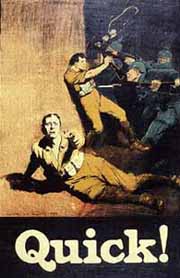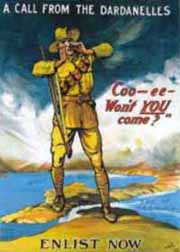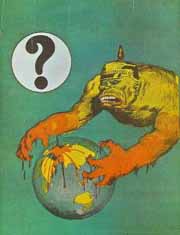Down through the years the Australian soldier became respected as a reliable fighter; a mate, when a mate meant the difference between life and death and, above all, the Australian soldier was considered to be a ‘larrikin’ who saluted but would not ‘dip his lid’ to no man. He was Aussie, he was Cobber, he was Bluey, he was Pongo, he was Curley and he was Digger. His progress has been documented in song.

To survey the songs that Australians have sung in the eleven wars that we have fought in is to study folklore in action. It seems incredible but eleven times we have responded to the sound of the bugle and every time it was a call to join our allies at arms. We fought in the so-called ‘Maori Wars’ of Taranaki and Waikato, a contingent of gallant lads travelled to the Sudan War and then our famed lighthorsemen galloped into the Orange Free State to do battle with the Boers. Next came the Boxer Rebellion and then the first and second World Wars. We glibly believed that WW2 was ‘the war to end all wars’ but we were wrong and our troops were once again called to war in lands ‘too close to home’ – Malaya, Malta, Korea and Indonesia and these were followed by the horrors of Vietnam. As if to remind us that war is always ‘just around the corner’ our troops rallied in 1990 to confront the threat of yet another uprising in the war-torn Middle East.
Australians have sung in every war. They sang on the march to relieve boredom and as an aid to maintain uniform marching time, they sang in the barracks, they sang in the troop trucks as they cris-crossed foreign lands and, of course, they sang in the trenches. Above all, they sang on those rare opportunities when they were ‘temporarily free men’ on leave and on the rantan.
With all the kafuffle of the 1995 anniversary celebrations one got the picture that our diggers only belted out songs like ‘Lili Marlene’ and ‘Till We Meet Again’ however this is far from the truth for our soldiers were renowned singers and in true-blue Australian style the songs they sung were a long way away from Florrie Forde’s ‘Tipperary’ and Vera Lynn’s ‘White Cliffs Of Dover’!
Whether the point of the song was directed at the enemy, or at the army institution, or at the seemingly deplorable character and attitude of any or all Sergeant Majors, or whether it compares the singers’ troop unit with other units (always with much ridicule of the latter), or dwells plaintively on the delights of beer and women; or whether it has no point whatever and is just plain silly – the idea is the same: get your troubles off your chest and ‘pack up all your cares and woes’.
As a folklore collector I tend to be like a recycling unit that gathers in the material and then returns it in a more user-friendly package. I see folklore as a social barometer and as far as military folklore is concerned it can also be seen as an emotional barometer for heartfelt songs and poems can often tell the story far better than facts and figures. It is interesting to observe that the military songs, like songs from other historical periods of frustration and fear such as those from the Great Depression, tend to be short and, in true Australian style, they don’t beat around the bush preferring to call a spade a spade! They also make liberal use of the parody and it seems as if no subject nor popular song is sacred from the songwriter’s aim!
The first songs come from the enlistment training camps where ‘new chums’ are supposedly screeched at, made to salute anything that moved, marched endless miles to nowhere with seemingly no reason and fed unbelievably disgusting food and made to drink tea and coffee loaded up with ‘bromides’! Small wonder ditties like this parody of ‘Bye-Bye Blackbird’ gained wide favour!
Pack up all your bags and kit,
Puckapunyal’s’ up the shit,
Bye-bye Pucka,
Stew for breakfast,
Stew for tea,
No more bloody stew for me,
Bye-bye Pucka.
No more hiking over bloody mountains,
We’ll be drinking Fosters out of fountains.
No more blanco, no more brass,
You can stick them up your arse,
Pucka bye-bye.
It wasn’t long before the recruits were singing the damnation of anyone who wore a stripe or crown and considering that the average Warrant Officer had a tendency to scream didn’t make things any better. The only retaliation was through songs and jokes that demeaned such absolute power.
Sod ’em All (Tune: Bless ’em All)
Sod ’em all, sod ’em all,
The long and the short and the tall,
Sod all the Sergeants and W.O. ones,
Sod all the Corporals and their bastard sons,
For we’re saying goodbye to them all,
As back to their barracks they crawl,
You’ll get no promotion
This side of the ocean,
So cheer up me lads, sod ’em all.
The Australian digger had a reputation for caring little for the shenanigans of the top brass and one story relates how an Australian soldier passed a British Officer without saluting.
British Officer: “Soldier! Why didn’t you salute me!”
Digger: “Bugger you, mate! Think a man’s a bleedin’ windmill? ‘Ave a good look at me and then go ‘ome and tell yer ma that you’ve seen an Australian soldier!”
A well-known ditty also commented:
We are a ragtime army,
The Australian AIF,
We cannot shoot,
We won’t salute,
What bloody use are we?
And when we get to Berlin,
The Kaiser he will say:
Ach, ach, mein gott
What a bloody rotten lot,
The Australian AIF.
There was also a general feeling that the average foot-slogging soldier was carrying the greater part of the war effort as everyone above him passed the buck as these two parodies indicate:
(Tune: MacNamara’s Ball)
Oh, the Colonel kicks the Major,
And the Major has a go.
He kicks the poor old Captain ,
Who then kicks the NCO.
And as the kicks get harder,
They are passed on down to me.
And I am kicked to bleeding hell
To save democracy!
(Tune: A Wee Doch And Doris)
The Brigadier he gets the turkey,
The Colonel has his duck.
The Officers have poultry,
They always were in luck.
The Sergeants have bread and cheese
And mop up all they can,
But all the poor old private gets
Is bread and tinker’s jam!
The folklore process seems to thrive in putting new words to old tunes and I have a vague memory that I first heard the following verses at school where the Marist Brother’s Kogarah Army Cadets marched to the strains of ‘Colonel Bogey’
Bollocks! was all the band could play.
Bollocks! they played it night and day.
Bollocks! yes, it was Bollocks!,
It was Bollocks! Bollocks!
You could hear it two hundred miles away.
Bullshit! was all the Sergeant could say. Bullshit! he said it night and day. Bullshit! yes, it was Bullshit, It was Bullshit! Bullshit! You could hear it two hundred miles away!
The Army lives by the sound of the bugles and its calls summonsed the soldiers from their first waking hour to their last. Many soldiers told me how they hated the sound of this not-so-musical instrument and it was quite common to put words to the various calls:
Assemble Call: You’re In The Army Now.
You’re in the army now,
You’re not behind a plough;
You silly young twitch,
You’ll never get rich,
You’re in the army now.
Call: No Parade Today.
There’s no parade today, there’s no parade today,
The Colonel’s got stomach ache, the Adjutant’s away.
Call To Picket Duty
Come and do your picket, boys,
Come and do your guard,
‘t’isn’t very easy, boys,
‘t’isn’t very hard.
Call: To Sick Parade
This is the sick parade,
Please keep away.
Where you get ‘number nines’
Three times a day.
Where you can’t swing the lead,
Not a chance of going to bed,
(unless you’re nearly dead).
So GO AWAY!
Call To Mess
Come to the cook house door, boys,
Come to the cook house door,
Stew, stew, stew, stew,
Stew for dinner today.
Whilst Bluey and Curly were cursing the top brass their real curses were for the enemy and in all our wars we have found it necessary to put a face to the enemy. In the Boer War it was Paul Kruger, Kaiser Bill in WW1, Hitler in WW2 then right down to Uncle Ho in Vietnam and Saddam Hussain in the Gulf War. The enemy was targeted in propaganda and also in song and it was this firing of contempt that fuelled the war machine into action.
It was in the early days of WW1 that Australia’s unofficial national anthem, ‘Waltzing Matilda’, possibly saw its first role as a parody carrier.
Fighting the Kaiser, fighting the Kaiser,
Who’ll come a-fighting the Kaiser with me?
And we’ll drink all his beer,
And eat up all his sausages,
Who’ll come a fighting the Kaiser with me!
There is little doubt in my mind that the most popular song to come out of WW2 was that song about Adolph’s anatomy and I often wonder if Der Fuehrer ever got to hear this parody on ‘Colonel Bogey’.
Hitler, has only got one ball,
Goering, has two but very small,
Himmler, has something similar,
But poor old Goebbels has no balls at all.
Hitler has only got one ball,
The other is in the old town hall,
His mother, she pinched the other,
Now Hitler ain’t got none at all!
Other songs were aimed directly at the enemy as way of frontline conversation as in this parody of ‘Hold Your Hand Out Naughty Boy’ where digger is giving a warning to his German counterpart nicknamed Allemande (a derivation of the French pronunciation):
Keep your head down, Allemande,
Keep your head down, Allemande.
Last night in the pale moonlight
I saw you, I saw you,
You were fixing your barbed wire,
So we opened rapid fire;
If you want to see your sister,
Your brother and your mother,
keep your head down, Allemande.
When our diggers were in the Middle East the songs once again focused in on a public face and King Faruk and Queen Farida came in for much derision and especially in this ditty sung appropriately enough to the Egyptian National Anthem ‘Salute To The King’ as sung to me by Len Sprong of Wollongong:
Old King Faruk, Old King Faruk,
Hang your bollocks on a hook,
Squire, squire, squash keterre, bah dean.
Queen Farida, Queen Farida,
How the boys would love to ride her,
Squire, squire, squash keterre, bah dean.
There are most probably two songs that come to the mind of every WW2 veteran and they are ‘Mademoiselle From Armentieres’ (both the clean and the not-so-clean version) and the story of ‘Lili Marlene’ as sung by Lala Anderson. ‘Lili Marlene’, perhaps the most popular army song ever, was written by a German soldier during WW1 and, surprisingly to many, it was about two different girls – Lili and Marlene – who used to wait for him every evening, underneath the lamp lights across the barrack square. At one stage German propaganda chief, Goebbels, instructed the Nazi Radio to broadcast the song every night at precisely 9.57pm as a cheering message for the German troops. As the tune inevitably wafted over to the trenches of the allies they too took up the song as their own and there are even stories of both sides marching to battle singing ‘Lili Marlene’!
Putting together a representative folklore collection on any subject is a bit like putting a crossword together with one contact leading to another. As I started to close off on my research it became apparent that I was missing material from several areas specifically the navy and the women’s services. I wrote to magazines, talked to veterans and eventually the pieces came together. I was particularly excited to find several songs from the women who worked their war effort in the Land Army. Just like the songs of the frontline soldiers the Land Army songs sang about the good times to come, the bad food, the lack of romance and the next leave break. Edna Mary ‘Sylvia’ Newman learnt this one when she served in the Land Army at Griffith.
(Tune: How You Going To Keep Them Down On The Farm)
How you gonna keep them down on the farm,
After they’ve seen Syd-ney.
How you gonna keep ’em away from Kings Cross,
Jazzin’ around, paintin’ the town,
How you gonna keep ’em away from harm,
That’s the mys-tery.
They’ll never want to see a rake or a plough,
And who the hell can Yankee-do a cow?
So how you gonna keep ’em down on the farm,
After they’ve been on leave!
WW1, closely followed by WW2, certainly appears to have produced the most songs and this probably reflects the fact that the radio industry worked hand-in-hand with the recording industry and singalongs were the main form of popular entertainment. The Vietnam War, by comparison, occurred at a time when our entertainment patterns had already changed and we had become a nation of people who got entertained rather than entertained each other. In the Gulf War we followed our war accepting as normal the continuing interruption of scheduled television commercials. Another reason for the continuing decline in the creation of song is that warfare has changed dramatically. Gone are the days (and nights) when ‘digger’ was stationed in a trench for war is now ‘hi tech’ and primarily a series of computerised air strategies. It is difficult to sing to a computer!
This isn’t to say that our soldiers and airmen didn’t sing in the Korean, Vietnam and Gulf Wars. It took quite a bit of digging but I did find several songs from the recent wars. Frank Collett, a Vietnam veteran, sang me ‘Bien Hoa Roll In’ to the tune of ‘My Bonny Lies Over The Ocean’
drawing by James Low I went off to southeast Asia
To fight my own war in the air;
I’ve spent half my tour in a bunker;
I don’t think that it’s really fair.
Roll in, roll in, my God how the rockets roll in, roll in.
Roll in, roll in, my God how the rockets roll in, roll in.
Each day I go off to fly combat,
Then have a beer on the ground;
I usually finish the first one
Before we receive the first round.
Each morning we go off to combat,
At dawn in the cloud, fog and damp;
The Army is up even sooner
To run the VC from the ramp.
And now that my tour it is over,
I’ll resume the life that I led;
My wife still thinks that it’s silly
To put sandbags all ’round our bed.
These songs, like the songs composed in earlier wars, served a multiple purpose. Firstly they were composed to entertain and, like many folk based songs, also to act as a message or warning as they told of the dangers of venereal disease, of using equipment carefully otherwise you would be ‘scraped off the tarmac like a blob of strawberry jam’ and to instil a certain hatred of the enemy. They also acted as a builder of solidarity and considering that most singalong sessions were staged in local bars, the canteen or in the ablution block then the songs played a role in building camaraderie. There was also the fact that the songs were very much a way of relieving tension and in wars this pressure valve was the only way to divert from the horrors of seeing your mates blown sky high.
The songs were often ‘localised’ and it is common to find references to various members of the unit. This was also a way of ‘letting off steam’ and where soldiers lived such close lives the idea of a rowdy drinking session was far more desirable than a fisticuff donnybrook. It was at such rowdy sessions that the rowdier, bawdier songs came out and nearly every soldier can elaborate on the doings of that certain Mademoiselle From Armentieres and how ‘Up the rickety stairs they went, When they came down their knees were bent! Inky Pinky Parlay Vous’
My father, a Sergeant Major in the New Guinea campaign and a fine ‘shower singer’ had a kit full of bawdy songs including one he called ‘Wallop It Home’ whose ribald chorus offered: ‘Put your belly close to mine and wriggle your bum!’ and another favourite seems to be related to the Groucho Marks song ‘Lydia, Lydia that encyclopaedia, Lydia the tattooed lady’. Dad’s song went to the tune of ‘My Home In Tennessee’:
I paid a franc to see, a fair tattooed lady,
And right across her jaw, were the words ‘Great Anzac Corp’,
And on her chest was a possum and a great big Kangaroo,
And on her back was a Union Jack,
And the words ‘Red White and Blue’.
A map of Germany was where I’d never been,
And up and down her hips was a line of battle-ships,
And on her kidney, on her kidney,
Was a bird’s eye view of Sydney,
And ’round the corner, ’round the corner,
Was my home in Woolloomooloo.
The parody often became as well known as the original song and this was certainly the case with ‘A Wee Doch And Doris’, ‘Tipperary’ and ‘The Road To Gundagai’ all of which attracted new verses with numerous variants. Sometimes the song titles begged to be parodied and it is easy to see how ‘My Little Grey Home In The West’ ended up as ‘I’ve A little Wet Home In A Trench’, ‘Boys Of The Dardenelles’ became ‘Boys Of The Suez Canal’, ‘It’s A Long Way To Tipperary’ became localised to ‘It’s A Long Way To The Riverina’ and how that much-loved old bush song ‘The Dying Stockman’ became ‘The Dying Airman’. The parodies were not confined to WW1 and 2 and during the struggles over Taiwan the Andrew’s Sisters hit ‘Rum and Coca Cola’ became ‘Holding Quemoy And Formosa’. In the Vietnam War ‘Click Go The Shears’ reappeared as ‘Slash Go The Bayonets’ and two of the most widespread parodies from the Gulf War were the Phil Collins song ‘Something In The Air Tonight’ which took on new meaning and John Schuman’s ‘I was Only Nineteen’ which became ‘I Was Only Ground Crew’.
© Warren Fahey
notes
This article appeared in Speewah (September 2000) It is presented here with the author’s permission.
Warren Fahey’s book ‘Diggers Songs‘ ,was published by Australian Military History Press, 1996. He is still interested in collecting further Australian military songs.



